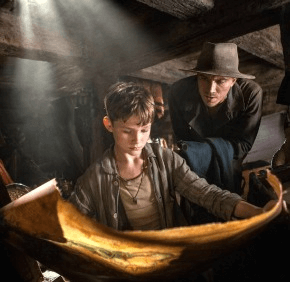By John Mulderig
Catholic News Service
NEW YORK – Fidgeting with the iconic characters of a classic story is a dicey business at best. So it’s no great surprise that “Pan” (Warner Bros.), director Joe Wright’s attempt to provide J.M. Barrie’s Peter Pan with an original backstory, turns out to be little more than a lavish but hollow special-effects extravaganza.
What’s more likely to raise eyebrows, at least among moviegoers of faith, is the thorough trashing of the Catholic Church that Wright and screenwriter Jason Fuchs engage in before their story departs World War II-era London for Barrie’s Neverland.
Their freewheeling aesthetic vandalism plays out against the background of the oppressive orphanage to which Peter — eventually played by Levi Miller — was entrusted in infancy by his mother, Mary (Amanda Seyfried).
There, Mother Barnabas (Kathy Burke), the piggish glutton of a nun who runs the place, hoards food from her hungry charges as the Luftwaffe drops its bombs. Entrance to her underground cache of delicacies is obtained by twisting the nose of a statue of the Virgin Mary.
Mother Barnabas’ behavior is of a piece with that of the other “Sisters of Eternal Prudence,” as a plaque on the wall identifies the facility’s presiding order. In fact, compared to the gruel, corporal punishments and soul-crushing emotional abuse they dole out, Peter’s later challenges seem like a jaunt in the country.
Those subsequent trials arise after Peter is whisked off to Neverland by minions of the nefarious pirate Blackbeard (Hugh Jackman). Blackbeard is waging a war against his world’s forces of light, and uses kidnapped youths like Peter as slave laborers mining for powerful fairy dust.
Naturally Peter rebels, aided eventually by comely native warrior Tiger Lily (Rooney Mara) and by a young James Hook (Garrett Hedlund, channeling James Coburn). Hook is, of course, Peter’s future nemesis according to the canonical sources. Here, however, he’s a likable — though withdrawn — veteran of the mines who somewhat reluctantly becomes Peter’s mentor.
Having demolished the only version of Christianity on offer in their film, Fuchs and Wright toy with talk of Peter as the promised “messiah” of this alternate universe. The figure of his estranged mother, with whom he longs to be reunited, becomes a subtly posed flesh-and-blood alternative to her namesake, the un-nurturing and dishonored plaster version of maternity proposed to him by Catholicism.
The path of religion, the script suggests, involves a denial of each person’s uniqueness and potential for great things.
Thus Mother Barnabas — another bogus maternal persona, one who perversely starves rather than selflessly nourishes her children — emphatically informs Peter that, whatever the absent Mary may have thought of him, as evidenced by a suppressed note from his mom the lad has managed to discover, he’s nothing special.
By contrast to the despair that must inevitably result from such a pride-destroying faith, the magic of Neverland, which has at least some touches of the new age movement about it, holds out the promise of true fulfillment. Its alchemy transforms anonymous, downtrodden orphans — and Blackbeard’s indistinguishable drones — into prophesied heroes living out their destined greatness.
Unsuitable even for adults, this perilous cinematic journey — part run-of-the-mill theme ride, part wishful, willful ego trip — is certainly not safe for children.
The film contains mean spirited anti-Catholicism, a negative view of religion in general, brief sacrilegious and scatological humor, much stylized violence and a few mild oaths. The Catholic News Service classification is L — limited adult audience, films whose problematic content many adults would find troubling. The Motion Picture Association of America rating is PG — parental guidance suggested. Some material may not be suitable for children.
See also:


